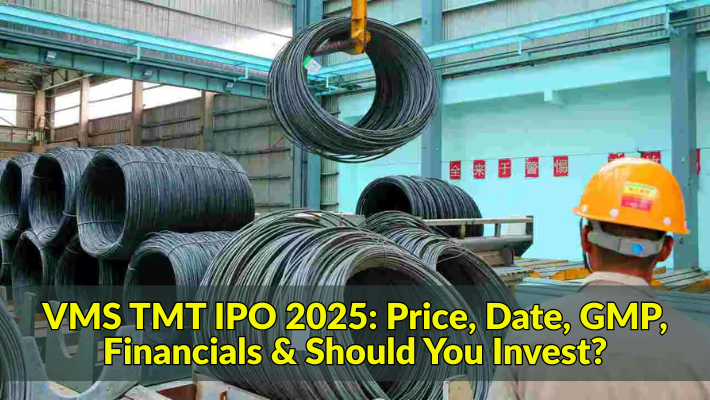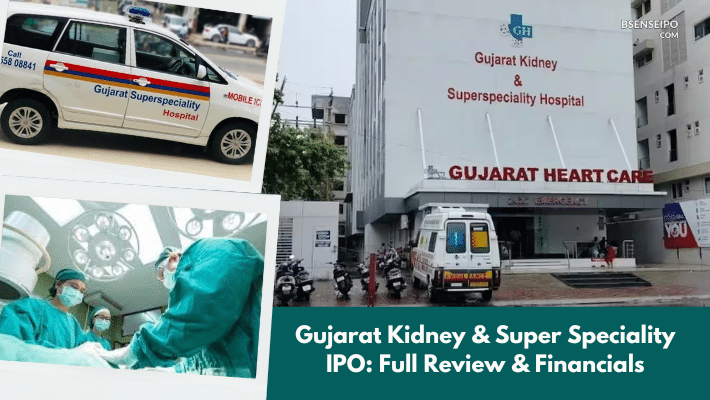VMS TMT IPO 2025: Price Band, Debt Repayment Plan & Long-Term Growth Potential
VMS TMT IPO: Gujarat-based VMS TMT plans to raise ₹148.5 crore via fresh issue, using ₹115 crore to cut debt, even as FY25 revenue dips; here’s what investors should know — strengths, risks, and how VMS stacks up against automotive giants in brand & market positioning.
Introduction
VMS TMT Ltd., a steel manufacturer specializing in Thermo Mechanically Treated Bars (TMT bars) under the Kamdhenu brand, is set to launch its IPO in mid-September 2025. The issue is designed to be a fresh issue only (no Offer-for-Sale/secondary component), with proceeds largely intended to reduce debt and improve financial leverage. For investors, balancing the company’s improved profitability against its declining revenue and high leverage will be key.
Key TMT bars IPO Details
VMS TMT IPO opens Sep 17-19, 2025 with a price band of ₹94-99/share. Entirely a fresh issue aiming to raise ₹148.50 crore, with major portion for debt reduction. FY25: revenue down ~11.8%, but profit up ~14.5%. We analyze financials, risk factors, competitive landscape, and compare brand strength using automotive analogies.
| Parameter | Detail |
|---|---|
| IPO Type | Fresh issue of 1.50 crore equity shares (face value ₹10 each) |
| Price Band | ₹94 ‐ ₹99 per share |
| Issue Size (Expected) | ~ ₹148.50 crore (at upper band) |
| IPO Dates | Opens: 17 September 2025; Closes: 19 September 2025 |
| Basis of Allotment | 22 September 2025 |
| Listing Date | Tentatively 24 September 2025 on both BSE & NSE |
| Use of Proceeds | ~ ₹115 crore for debt repayment; balance for general corporate purposes |
Financial Performance & Trends
- Revenue Trend: FY25 saw revenues of ~₹770.2 crore, reflecting an ~11.8% decline from FY24. Profitability: Net profit (PAT) rose by ~14.5% to ~₹15.42 crore in FY25.
- Recent Quarter (Q1 FY26 – ended June 30, 2025): Revenue ~₹213.39 crore; PAT ~₹8.58 crore.
- Debt & Leverage: As of June 2025, total borrowings are ~₹261-₹262 crore. The company intends to use most of the IPO proceeds to reduce this debt.
Strengths & Risks
Strengths
- Debt Reduction Strategy: Using a large chunk of fresh capital (≈ ₹115 crore) to reduce financial liabilities may improve its balance sheet and reduce interest burden.
- Fresh Issue Only: Investors know that capital is being deployed into the business rather than enriching existing shareholders. This aligns with growth/debt reduction priorities.
- Local Brand Under Trusted Trademark: Producing TMT bars under the Kamdhenu brand via a license agreement helps leverage brand recognition and credibility.
- Capacity & Location: The manufacturing facility in Bhayla Village, near Bavla in Ahmedabad district, provides advantages in logistics in Gujarat as well as access to markets.
Risks
- Revenue Decline and Demand Pressure: The 11.8% fall in revenue in FY25 indicates possible demand weakness, pricing pressure, or competition; maintaining growth will depend heavily on infrastructure projects or construction sector trends.
- High Leverage: Even after debt reduction, remaining liabilities plus any future debt could strain margins if costs of raw materials (billets, scrap), energy, and freight increase.
- Geographic Concentration: Majority of sales are in Gujarat; limited diversification could hurt if the local market slows or supply chain/regulatory issues arise.
- Raw Material Dependency: As with most steel-based manufacturers, cost and availability of billets, scrap, energy, etc., are major determinants of profitability.
Market & Industry Outlook
India’s infrastructure thrust—roads, affordable housing, highways, metro projects—continues to create demand for TMT bars. Growth in Tier II and Tier III cities and continued urbanization are favorable tailwinds. On the other hand, global steel price volatility, input cost inflation, energy cost, and environmental regulations are challenges.
Should You Subscribe? Investor Perspective
Here are some points investors may want to weigh before subscribing:
- If you believe that infrastructure, affordable housing, and construction demand will recover and grow, VMS TMT has upside potential.
- Because the issue is a fresh issue only, returns depend on execution and demand rather than financial engineering.
- The valuation at the upper band (₹99) needs to be considered relative to comparable steel/metal companies with similar debt levels and growth rates.
- Monitor grey market premium (GMP), allotment demand (especially retail vs institutional), and initial trade behavior after listing.
- Consider whether the company’s cost pressures (raw material, energy) can be controlled, and whether regulatory/environmental compliance could become more expensive in the future.
Conclusion
VMS TMT’s IPO offers a potentially interesting entry point into the steel / TMT bar sector, especially for investors looking for plays on infrastructure growth and steel demand in India. Its strategy of using proceeds to trim down debt is a positive. However, revenue decline in FY25, high leverage, and geographic concentration raise significant warnings.
For those with moderate risk tolerance, this IPO could deliver reasonable gains if the construction sector rebounds and margins improve. For conservative investors, waiting for post-listing performance and continued quarterly results may be safer.
(Disclaimer: Recommendations, suggestions, views and opinions expressed by experts are their own. Investors are advised to consult certified financial advisors before making any investment decisions.)




